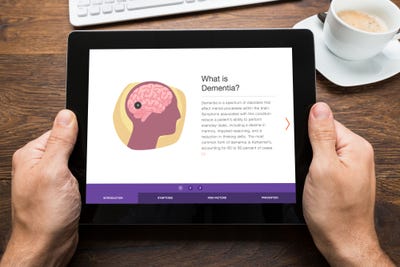How an App Could Catch Dementia Early
July 19, 2017
A Canadian medical software developer wants to bring dementia detection into the digital health era with its app-based Braintest.
Nancy Crotti

Braintest, available for iPads and Android tablets, was designed to offer an electronic version of SAGE, which has been the standard screening method for cognitive impairment or dementia for more than two decades.
Patients who suspect they have cognitive impairment or dementia tend to wait too long before alerting their doctor -- often too late for medication to help.
Cognitive neurologist Douglas Scharre set out to change that more than 20 years ago by developing a simple screening test that patients could take at home. Scharre's employer, Ohio State University's Wexner Medical Center, has made the Self-Administered Gerocognitive Examination (SAGE) available for download for years, but patients could only take it using a pencil and paper and bring it to their doctor for interpretation.
This week, a Canadian medical software developer rolled out an electronic version of SAGE called Braintest, for iPads and Android tablets. Scharre, who directs Ohio State's Medical Disorders Research Center, presented validation data for the app-based test at the Alzheimer's Association International Conference 2017 in London.
Braintest has the potential for huge success. Consumers responding to national media reports of validation test results for SAGE in 2014 shut down Ohio State's website. Within six months of those reports, SAGE had been downloaded more than 1 million times, Scharre noted. An estimated 5 million Americans have Alzheimer's disease, the most commonly known form of cognitive impairment, according to the Centers for Disease Control. With the aging of the Baby Boomer generation, that number could rise to 13.2 million by 2050.
The test itself takes about 15 minutes, and results are available in a few days, according to Braintest founder Frederick Ghahramani. Braintest employees score the test and a board-certified physician delivers the explanation of results to the patient via video. The patient can play the video for family members and their doctors.
Braintest founder Ghahramani also started mobile social game company airGames, and has a personal stake in helping patients with cognitive impairment and their families. His grandfather had vascular dementia, and his father developed symptoms of cognitive impairment five years after his grandfather died. Ghahramani's family had difficulty talking about the situation and wondered if there was a test to perform at home. They found one that could only be administered in a doctor's office and then found SAGE.
"I realized there was a more meaningful and simple way to bring this home," he said. "The thing that struck me about SAGE was that it's self-administered."
Ghahramani approached Ohio State about developing SAGE in app form, licensed it, and brought Scharre on as a consultant. Patients can download the test to take once for $39 or multiple times at $25 per test.
"It's not just a digital version of a test. It's an actual consumer experience," Ghahramani said. "You have a baseline and every six months you repeat."
SAGE and Braintest can help remove barriers to early care erected by fearful or embarrassed patients, or by busy or dismissive doctors, according to Scharre.
"This gives them some control over their healthcare," he said. "People really like that."
Nancy Crotti is a contributor to Qmed.
[Image credit: Braintest]
About the Author(s)
You May Also Like

.png?width=300&auto=webp&quality=80&disable=upscale)
